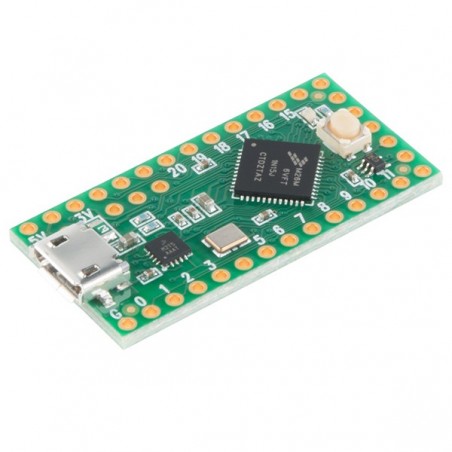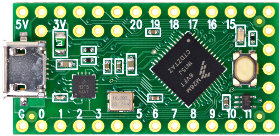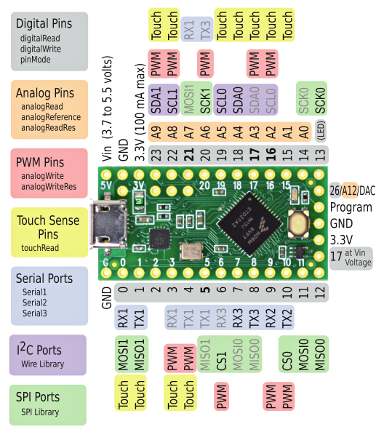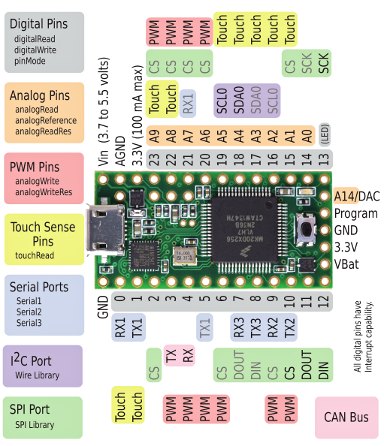- DESCONTINUADO








O Teensy LC é uma placa de desenvolvimento com um microcontrolador de 32bits a um preço muito acessivel.
Vem com bootloader para programação direta por USB sem necessidade de programador externo. Pode desenvolver os seus programas usando um editor de C ou instalar o add-on Teensyduino para o Arduino IDE e assim usar sketches Arduino no seu Teensy!
DESCRIÇÃO EM PORTUGUÊS BREVEMENTE DISPONÍVEL
Se tiver alguma dúvida neste produto não hesite em contactar-nos.
*Atenção: as imagens são meramente ilustrativas.
Teensy-LC (Low Cost) is a powerful 32 bit microcontroller board, with a rich set of hardware peripherals, at a very affordable price!

Teensy-LC delivers an impressive collection of capabilities to make modern electronic projects simpler. It features an ARM Cortex-M0+ processor at 48 MHz, 62K Flash, 8K RAM, 12 bit analog input & output, hardware Serial, SPI & I2C, USB, and a total of 27 I/O pins. See the technical specifications and pinouts below for details.
Teensy-LC maintains the same form-factor as Teensy 3.1, with most pins offering similar peripheral features.
Most modern projects involve serial communication with sensors, other chips, other systems, or even the internet. Hardware serial ports greatly simplify projects and enable excellent performance.
Teensy-LC provide plenty of serial connectivity: 2 SPI ports, 2 I2C, and 3 Serial ports. All 3 serial ports are supported by high quality drivers in Teensyduino, with both transmit and receive buffering, and even support for RS485 transmitter enable.
Teensy-LC will be ideal for inexpensive "Internet Of Things" projects when paired with a ESP8266 Wifi module, which requires a fast hardware serial or SPI port.
Teensy-LC has the same powerful USB hardware as Teensy 3.1. All USB data transfer is done directly to memory with minimal CPU overhead.
Teensy-LC supports USB Serial, MIDI, Keyboard (international layouts), Mouse, Joystick, and RawHID protocols. A full set of 16 bidirectional USB endpoints are supported by the hardware, allowing any type of USB device. As more USB protocols are added to Teensyduino, despite its low cost, Teensy-LC will be up the task.
Many Arduino libraries require a hardware timer. Traditional Arduino products have 3 or 4 timers, with only 1 or 2 providing more than 8 bit resolution.
Teensy-LC has a total of 7 timers, all of them with 16 or more bits of resolution, to allow excellent compatibility with easy-to-use libraries. Many combinations of popular libraries, which would normally conflict, can seamlessly run together on Teensy LC and Teensy 3.1.
Analog signals are critically important to many projects. Teensy-LC has 13 pins than can function as analog inputs. The effective analog resolution is 12 bits.
It also has a true 12 bit digital to analog converter, for an analog output signal.
The Cortex-M0+ processor is a powerful, full 32 bit CPU, designed for lower power, lower cost devices.
Cortex-M0+ has fewer instructions and a simpler bus structure than the more powerful Cortex-M4 on Teensy 3.1. For simple code, M0+ often runs at similar speed, when running at the same clock frequency. For math-intensive applications, Cortex-M4 can be significantly faster, and of course it supports higher clock rates.
Cortex-M0+ at 48 MHz is much faster than 8 bit AVR processors at 16 MHz, especially when manipulating 16 and 32 bit variables!
TODO: expand this section... or add more details about the M0+ vs M4 differences.
Teensy-LC provides a 5V output to directly drive WS2812/NeoPixel LEDs.

A 74LV1T125 buffer is connected to pin 17, with the increased output voltage available on another pin.
Some features of Teensy 3.1 simply aren't available at this lower price point.
| Feature | Teensy LC | Teensy 3.1 | Units |
|---|---|---|---|
| Processor Core Rated Speed Overclockable |
MKL26Z64VFT4 Cortex-M0+ 48 - |
MK20DX256VLH7 Cortex-M4 72 96 |
MHz MHz |
| Flash Memory Bandwidth Cache |
62 96 64 |
256 192 256 |
kbytes Mbytes/sec Bytes |
| RAM | 8 | 64 | kbytes |
| EEPROM | 1/8 (emu) | 2 | kbytes |
| Direct Memory Access | 4 | 16 | Channels |
| Digital I/O Voltage Output Current Output Voltage Input |
27 3.3V + one 5V 5mA + four 20mA 3.3V Only |
34 3.3V 10mA 5V Tolerant |
Pins Volts milliAmps Volts |
| Analog Input Converters Resolution Usable Prog Gain Amp Touch Sensing Comparators |
13 1 16 12 0 11 1 |
21 2 16 13 2 12 3 |
Pins Bits Bits Pins |
| Analog Output DAC Resolution |
1 12 |
1 12 |
Pins Bits |
| Timers FTM Type PWM Outputs PDB Type CMT (infrared) Type LPTMR Type PIT (interval) Type Systick RTC (date/time) ** |
7 Total 3 10 0 0 1 2 1 0 |
12 Total 3 12 1 1 1 4 1 1 |
Pins |
| Communication USB Serial With FIFOs High Res Baud Fast Clock SPI With FIFOs I2C CAN Bus I2S Audio FIFO Size |
1 3 0 0 1 2 1 2 0 1 4 |
1 3 2 3 2 1 1 2 1 1 8 |
|
| ** RTC requires a 32.768 kHz crystal & 3V battery. See the Time Library for details. Teensy-LC has RTC logic on-chip, but lacks the oscillator & battery backup power. |
|||
Teensy-LC is designed for maximum compatibility with the Teensy 3.1 footprint.
| Teensy-LC | Teensy 3.1 | |
|---|---|---|
 |
 |
Special thanks to Nantonos for preparing this early Teensy-LC pinout graphic!
Teensy is much more than merely hardware. Teensy represents PJRC's ongoing commitment to developing more hardware powerful together with easy-to-use software support for microcontroller programming. Sales of Teensy fund substantial engineering work to develop and support open source software.
A good portion of the engineering time PJRC invests is used to contribute improvements and bug fixes to Arduino.
Teensy-LC and Teensy 3.1 are made in the USA.
Questions? Check out this Teensy-LC forum thread where many questions have been asked and answered.

O Teensy LC é uma placa de desenvolvimento com um microcontrolador de 32bits a um preço muito acessivel.
Vem com bootloader para programação direta por USB sem necessidade de programador externo. Pode desenvolver os seus programas usando um editor de C ou instalar o add-on Teensyduino para o Arduino IDE e assim usar sketches Arduino no seu Teensy!
